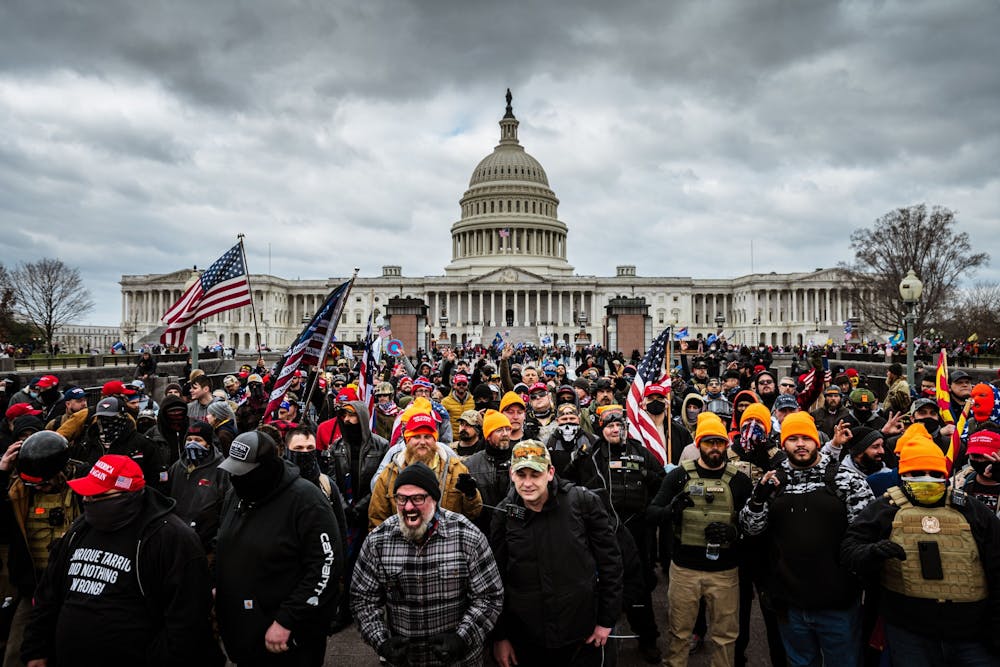Today marks the one-year anniversary of the Jan. 6, 2021, attack on the U.S. Capitol. That day, a joint session of Congress convened to certify the electoral vote victory of President Joe Biden. Approximately 2,000 supporters of former president Donald Trump protested the vote certification because they believed the election was fraudulent. They gathered in an attempt to “Stop the Steal,” ultimately breaching the Capitol building and forcing members of Congress to hide for their safety.
Five people died in the attack, and four police officers who were on duty that day have died by suicide since. Hundreds were injured. Of the more than 700 people who have been charged in relation to the insurrection, eight were from Indiana. Another arrestee was former IU student Anthony Vo.
While the attack was unprecedented, it was predicted in advance by extremism experts and intelligence officials, with pro-Trump groups planning the march and calling for violence online in the weeks after the election. Capitol Police had advance warnings of the attack but failed to prepare accordingly.
In the months since, Capitol Police have implemented a number of reforms recommended by Congress and other agencies, according to a United States Capitol Police press release.
IUPUI professor of history Raymond Haberski said the event was unprecedented in the sense that it was the first breach of the U.S. Capitol since the British attacked it during the War of 1812. But there has been political violence since the inception of the country, and there has been far-right, white Christian nationalist violence for decades, he said.
“While it was unprecedented to see it happen in the middle of D.C., it’s not that unusual to see them go after government officials, because they’ve done it in the West — Idaho, state of Washington, parts of Utah,” Haberski said.
He said the Republican Party’s presentation of itself as anti-government has become dangerous, almost to the point of willingness to endorse violence against their own government. According to National Public Radio, House impeachment managers said Trump incited the crowd to violence when he told the marchers to “fight like hell” just before they attacked the Capitol building.
In May 2021, the House passed a bipartisan plan to create a commission to investigate the insurrection, but Republicans in the Senate blocked it, according to the Senate roll call vote. In response, House leaders established a select committee, which has since uncovered knowledge of Trump’s behavior during the attack, texts between Fox News hosts and White House officials and more.
“I think it’s important for Congress to take a very strong stand and consistent stand on that investigation and to try to demonstrate through evidence and the law that people made decisions that are illegal, that people in positions of power are complicit,” Haberski said. “People have to go to jail.”
But politically, nothing has been done to reduce tensions in this country, Steven Webster, associate professor of political science at IU Bloomington, said. He cited a University of Massachusetts poll from late December 2021 that found 71% of Republicans believe Biden was not rightfully elected, and 80% of Republicans called the insurrection a “protest” rather than a “riot.”
“So even what we think about when we think about January 6 depends a lot on our partisan identities,” he said.
Webster said he expects political tolerance and commitment to democratic norms will continue to erode. For one thing, Republican elected officials are incentivized to keep their base angry to motivate them to vote and remain mobilized, he said.
While the system of investigating and prosecuting the events of Jan. 6, 2021, has not inspired confidence in all observers, Haberski recalled the Watergate scandal and said Republicans stonewalled that process. It seemed unlikely to work — until it finally did. Haberski said we may see something similar over the course of this investigation, too.
“We are in the middle of this process right now,” Haberski said. “In two years, it might look different. And you might feel much better about how American democracy showed up.”




